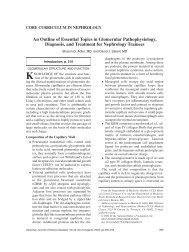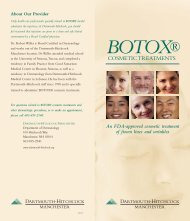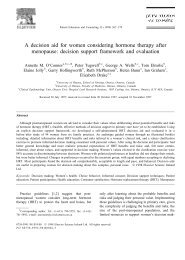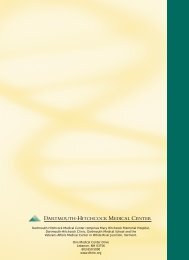Surgery and Healing in the Developing World - Dartmouth-Hitchcock
Surgery and Healing in the Developing World - Dartmouth-Hitchcock
Surgery and Healing in the Developing World - Dartmouth-Hitchcock
Create successful ePaper yourself
Turn your PDF publications into a flip-book with our unique Google optimized e-Paper software.
44<br />
442 <strong>Surgery</strong> <strong>and</strong> <strong>Heal<strong>in</strong>g</strong> <strong>in</strong> <strong>the</strong> Develop<strong>in</strong>g <strong>World</strong><br />
o<strong>the</strong>r people, students or o<strong>the</strong>r graduate health care givers, who jo<strong>in</strong> me <strong>in</strong> treat<strong>in</strong>g<br />
people across very large gulfs <strong>in</strong> economics, technology, religious, language, education,<br />
social <strong>and</strong> political boundaries. I have both practiced treatment, <strong>and</strong> sometimes<br />
reported <strong>the</strong> results of my observations <strong>in</strong> so do<strong>in</strong>g on how treatment modified<br />
both <strong>the</strong> treater <strong>and</strong> treated.<br />
At least one of <strong>the</strong>se reports recently published has drawn a considerable storm<br />
of protest as to <strong>the</strong> methods <strong>and</strong> permission of treatment of a group I had represented<br />
as my <strong>in</strong>tended beneficiaries <strong>in</strong> a medical aid project <strong>in</strong> Central Africa. After<br />
an <strong>in</strong>itial acceptance with some enthusiasm for <strong>the</strong> <strong>in</strong>tent <strong>and</strong> effect of <strong>the</strong> proposed<br />
health care <strong>in</strong>tervention, a m<strong>in</strong>ority op<strong>in</strong>ion was raised, not once, but on three<br />
consecutive peer reviews. The op<strong>in</strong>ions of <strong>the</strong> demurr<strong>in</strong>g reviewers can be taken<br />
from <strong>the</strong> titles “Moral Maladaptation” <strong>and</strong> “Medical Imperialism” of editorial op<strong>in</strong>ions,<br />
claim<strong>in</strong>g higher authority, quot<strong>in</strong>g Nuremberg Trial pr<strong>in</strong>ciples <strong>and</strong> <strong>in</strong>ternational<br />
political processes <strong>in</strong> organizations with or without <strong>the</strong> imprimatur of <strong>the</strong><br />
United Nations. These ethicists made <strong>the</strong> claim that ano<strong>the</strong>r universally accepted<br />
form of “due process” was not followed or was unacceptably modified <strong>in</strong> <strong>the</strong> constra<strong>in</strong>ts<br />
of <strong>the</strong> conditions under which <strong>the</strong> treatments were conducted. It is true that<br />
<strong>the</strong> majority of <strong>the</strong> reviewers found <strong>the</strong> reports acceptable <strong>and</strong> some even thought<br />
<strong>the</strong> process described might expla<strong>in</strong> elements of human species development <strong>and</strong><br />
differentiation. The misunderst<strong>and</strong><strong>in</strong>g or misrepresentation of <strong>the</strong> “undertak<strong>in</strong>g to<br />
treat” had given me pause, however, to reconsider by what right we might ever<br />
undertake to <strong>in</strong>tervene <strong>in</strong> <strong>the</strong> circumstances of ano<strong>the</strong>r, <strong>and</strong> endeavor to take it<br />
upon ourselves “to treat” when nearly all such treatment would <strong>in</strong>volve quite different<br />
“o<strong>the</strong>rs,” <strong>and</strong> a nearly <strong>in</strong>evitably wide gulf across which advocacy must function<br />
with imperfect <strong>in</strong>formation <strong>and</strong> limited underst<strong>and</strong><strong>in</strong>g.<br />
How might <strong>the</strong> Human Sciences help to illum<strong>in</strong>e this controversy <strong>and</strong> prevent<br />
<strong>the</strong> <strong>the</strong>oretic paralysis that might o<strong>the</strong>rwise lead to practice solipsism?<br />
Theory Constra<strong>in</strong><strong>in</strong>g Practice<br />
Practice patterns have evolved over time to describe, <strong>and</strong> <strong>the</strong>n prescribe ethical<br />
behavior of those who treat o<strong>the</strong>rs. These pr<strong>in</strong>ciples have been encoded <strong>in</strong> such<br />
supra-statal professional creeds as <strong>the</strong> Hippocratic oath, or a methodology known <strong>in</strong><br />
anthropology as participant observation, or <strong>in</strong> Kantian ethics as treat<strong>in</strong>g all subjects<br />
as entities who are not means toward some end but an end <strong>in</strong> <strong>the</strong>mselves with applications<br />
of any actions based <strong>in</strong> generalizable pr<strong>in</strong>ciples one might wish to have acted<br />
upon <strong>in</strong> one’s own treatment. This may be simplified <strong>in</strong> <strong>the</strong> Golden Rule. As generalizable<br />
as such a first pr<strong>in</strong>ciple might be, it might be caricatured <strong>in</strong> some extraord<strong>in</strong>ary<br />
real-world circumstances: “I want to treat as I might wish to be treated, if only<br />
I were not sick <strong>and</strong> starv<strong>in</strong>g just now as you seem to be.”<br />
The fundamental modification of <strong>the</strong> observed means that even <strong>the</strong> allegedly<br />
non<strong>in</strong>terventive practice of participant observation can come under considerable<br />
critical pressure for <strong>in</strong>terference <strong>in</strong> <strong>the</strong> lives of those observed. The somewhat contrived<br />
controversy over <strong>the</strong> genetic research among <strong>the</strong> Yanomami Indians that has<br />
recently embroiled many <strong>in</strong>stitutions has resulted <strong>in</strong> <strong>the</strong> reexam<strong>in</strong>ation of similar<br />
questions of <strong>the</strong> ethics of anthropologists’ behavior <strong>in</strong> ethnography alone, if not <strong>in</strong><br />
directly <strong>in</strong>vasive actions <strong>in</strong>to <strong>the</strong> lives of <strong>the</strong> communities under observation.<br />
The paternalistic assumption that we, older, perhaps, at least more knowledgeable<br />
if not wiser heads know what is best for not just <strong>in</strong>dividuals, but whole populations,<br />
underlies quite a number of actions taken <strong>in</strong> public health, with even some<br />
recent authors alleg<strong>in</strong>g that <strong>the</strong>re has been a failure of trust <strong>in</strong> not tak<strong>in</strong>g <strong>the</strong> impera-










